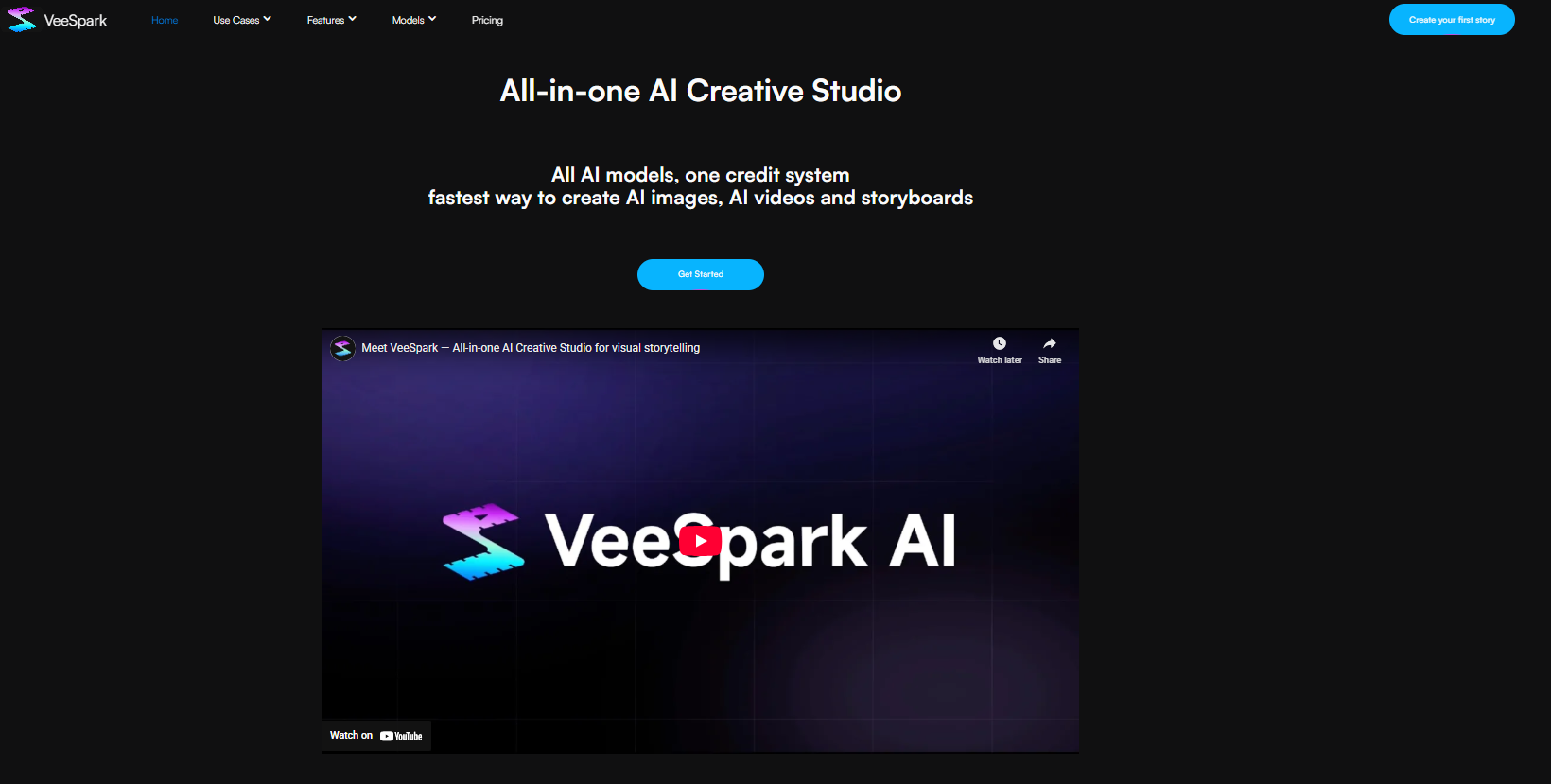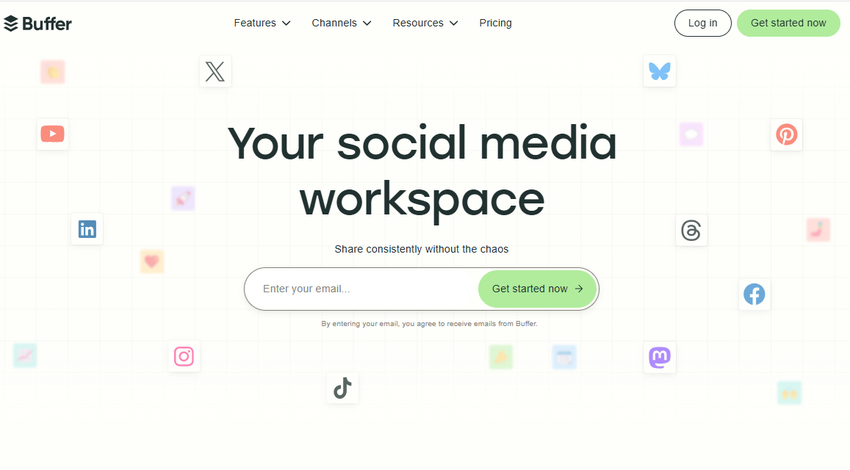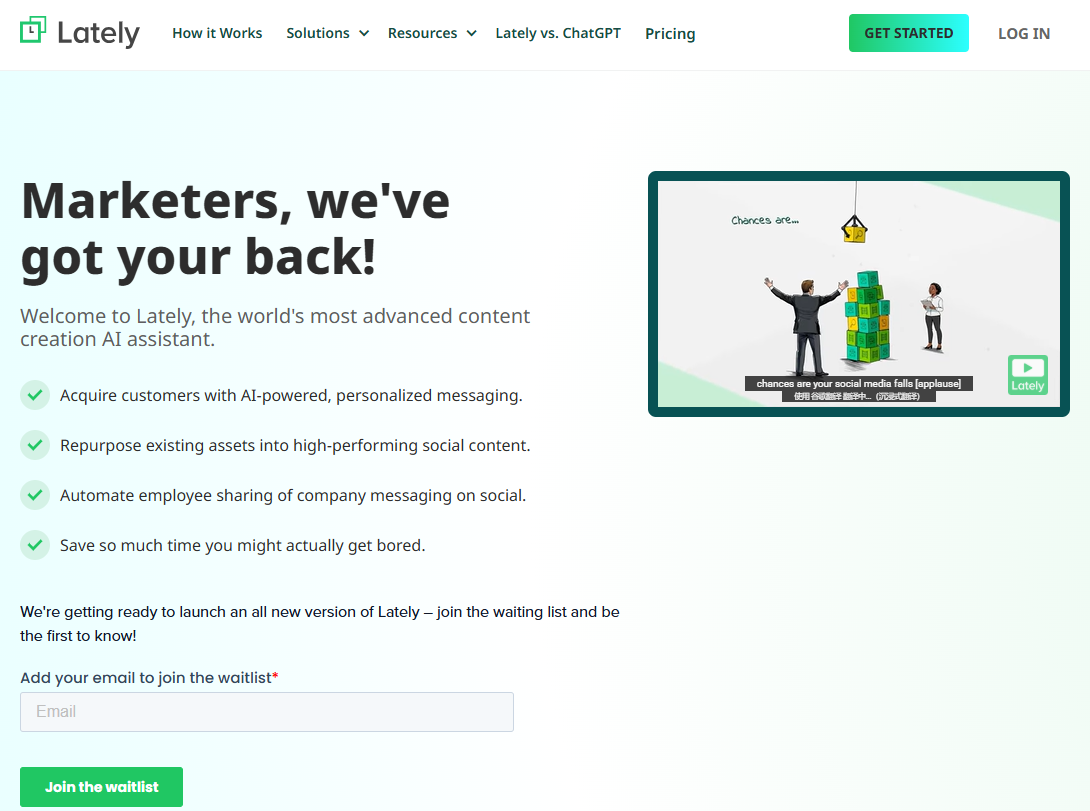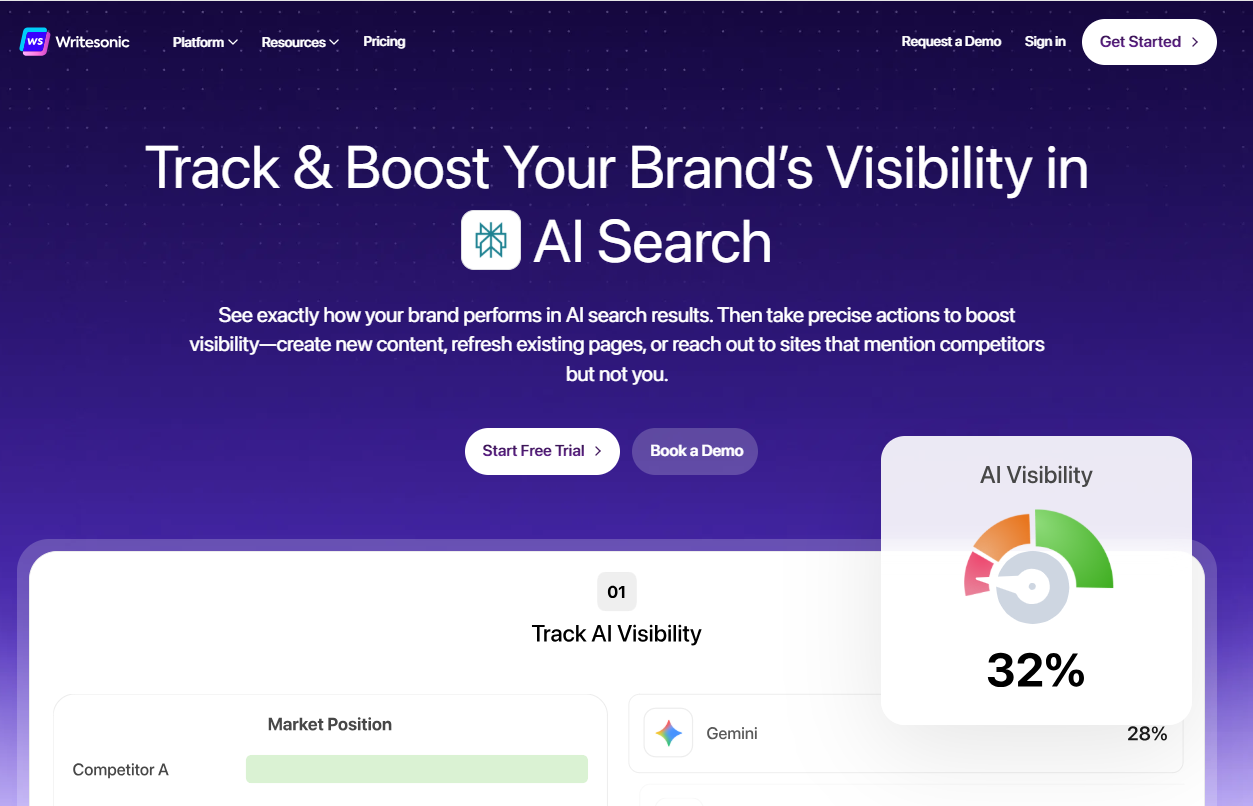Rhyno Hu
November 7, 2025
7 min
Rhyno Hu
November 7, 2025
7 min
Are you a small business owner looking for smarter, faster, and more affordable ways to grow in 2025? Artificial Intelligence (AI) is no longer just for big corporations—it’s now the secret weapon helping small businesses compete, create, and connect more effectively than ever. From crafting marketing campaigns that convert to generating social media posts and professional content in seconds, AI tools are changing how entrepreneurs work and win.
In this blog post, we’ll explore the best AI tools for small businesses in 2025—covering marketing, social media, and content creation solutions that save time, cut costs, and boost productivity. By the end, you’ll know exactly which AI software fits your goals and how to use it to grow your business with confidence and precision.

AI tools are essential for small businesses because they improve efficiency, accuracy, and growth potential. These tools automate tasks that usually require time and staff, allowing teams to focus on core business functions.
Cost Efficiency
AI reduces labor costs by automating tasks such as email responses, lead tracking, and report generation. For example, chatbots handle customer inquiries 24/7 without needing additional staff. Marketing automation tools schedule posts, send emails, and analyze campaigns automatically. This reduces the need for multiple software platforms or large marketing teams.
Increased Productivity
AI systems work continuously without fatigue. Tools for data management, inventory tracking, or content writing complete jobs in minutes that might take humans hours. This helps small businesses scale faster and meet growing demands without hiring new employees.
Data-Driven Decisions
AI uses large data sets to find patterns and trends. It can analyze customer behavior, website traffic, or sales data to predict future outcomes. For instance, an AI-powered analytics platform can tell a retailer which products are likely to sell best next month. These insights help business owners make better marketing and sales decisions.
Example: AI Analytics in Sales and Customer Experience
Imagine a small online store using an AI analytics tool. The software tracks what products customers view, how long they stay on the page, and what items they buy together. It then recommends promotions or bundles that appeal to those shoppers. The result: higher sales and a better shopping experience.
AI also improves customer support through chatbots that understand language, answer common questions, and provide instant solutions. This leads to faster response times and higher satisfaction without increasing costs.
AI Trends in 2025 for Small Business Growth
In 2025, the use of AI for small businesses continues to grow. Several key trends are shaping this shift:
AI-powered marketing automation: Tools that handle campaign planning, audience segmentation, and ad optimization automatically.
Conversational AI: Chatbots and voice assistants that improve customer communication.
AI-driven analytics: Deeper insights from customer and market data for smarter decisions.
Generative AI for content creation: Faster, more consistent marketing materials such as blogs, videos, and ads.
AI integrations with business management tools: Easier automation across accounting, CRM, and project management software.
These trends show how AI is becoming central to small business operations, helping companies compete on quality, speed, and personalization.

Selecting the best AI software for small business requires understanding specific goals, available budget, and technical capacity. The right choice depends on how a company plans to use AI—whether for marketing, writing, analytics, or operations.
Define Business Goals
Before choosing an AI tool, business owners should identify what problems they want to solve. For example, if the goal is to increase social media engagement, a marketing automation platform is ideal. If the aim is to improve website copy, an AI writing tool is more appropriate.
Clear goals ensure the selected software matches business priorities and delivers measurable results.
Check Integration Capability
The AI tool should connect smoothly with existing systems like CRMs, email marketing platforms, and analytics dashboards. Integration ensures data flows seamlessly across tools, improving accuracy and reducing manual input.
Compare Pricing and Value
Not every business needs expensive enterprise-level AI. Many small business AI tools offer free plans or affordable monthly subscriptions. Evaluate the features offered in each plan and compare them with your needs. Sometimes, a low-cost tool provides enough functionality for effective results.
Free versions are ideal for testing, while paid plans usually include advanced analytics, customization, and better support.
Focus on Scalability
Choose AI tools that can grow with the business. As your company expands, you’ll need software that handles more data and additional users without slowing down. Scalable AI solutions ensure long-term efficiency.
Prioritize Usability
A good AI platform should be easy to use. Complicated tools can slow down adoption and reduce productivity. Look for dashboards with clear interfaces and simple setup processes so your team can start using the software quickly.
Ensure Security and Data Accuracy
Since AI tools process large amounts of data, security is critical. Choose vendors that follow strong encryption standards and comply with privacy laws. Reliable AI systems also provide transparent data management and regular updates to maintain accuracy.
Vendor Reliability and Support
Work with trusted AI providers that offer strong customer support, tutorials, and continuous updates. Good vendor support ensures the system runs smoothly and delivers consistent results.
Free vs. Paid AI Tools
Free AI Tools: Ideal for startups testing automation or small tasks. They provide limited features but are suitable for beginners. Examples include Grammarly’s free version or Canva’s AI design tools.
Paid AI Tools: Better for established businesses needing full control, advanced analytics, and integrations. They often come with technical support and regular updates to match changing market needs.
Marketing and social media are critical areas where AI tools can help small businesses grow faster. They simplify campaign management, increase engagement, and reduce manual work. Below are some of the top AI tools for small businesses in marketing and social media in 2025.
VeeSpark – AI Commercial Video Generation
VeeSpark is an advanced AI platform that creates marketing videos from text prompts or short descriptions. Small business owners can produce professional-quality commercials without hiring a production team.
Key Features:
AI-driven scriptwriting and video editing.
Custom voiceovers and branding options.
Integration with social media platforms for easy publishing.Benefits: VeeSpark saves time and production costs while allowing small businesses to run visual marketing campaigns quickly. It is especially useful for local promotions, product demos, and social media ads.

Buffer – AI-Powered Social Media Management
Buffer helps small businesses build, schedule, and analyze social media posts efficiently. Its AI assistant suggests the best times to post, creates caption ideas, and analyzes audience engagement.
Key Features:
Multi-platform post scheduling (Facebook, Instagram, LinkedIn, X, etc.).
AI-generated content suggestions.
Performance analytics to track engagement and reach.Benefits: Buffer helps businesses maintain a consistent online presence and understand what content performs best. With its AI assistant, social media planning becomes faster and data-driven.

Lately.ai – Social Media Automation and Content Repurposing
Lately.ai uses AI to analyze long-form content (like blogs or podcasts) and turn them into ready-to-post social media snippets.Key Features:
Automatic content repurposing.
Tone and style adaptation based on audience feedback.
Integration with marketing analytics tools.
Benefits: It saves content creation time and ensures that small businesses post regularly across platforms.

Canva Magic Studio – AI Visual Design for Marketing
Canva’s Magic Studio combines AI-powered design suggestions with easy-to-use templates.Key Features:
Automatic image and layout generation.
AI text-to-image and text-to-video capabilities.
Brand kit tools for consistent design.Benefits: Small businesses can create ads, flyers, and social media graphics without hiring designers, maintaining a professional look across campaigns.
.png)
Predis.ai – AI for Social Media Creatives
Predis.ai generates social media posts, captions, and videos using brand tone and keywords.Key Features:
AI content generation for multiple platforms.
Hashtag recommendations and SEO optimization.
Data insights for post-performance improvement.Benefits: This tool helps small businesses and startups produce engaging visual and written content with minimal effort.

Content creation is one of the most time-consuming tasks for small businesses. AI tools simplify this by helping teams write faster, maintain quality, and stay consistent across all communication channels. Below are the best AI writing and content tools for SMBs.
Grammarly – Writing Enhancement and Clarity
Grammarly is one of the most reliable AI-powered writing assistants available. It checks grammar, spelling, and style while suggesting improvements to tone and readability.Key Features:
Real-time grammar and tone correction.
Style adjustments for emails, blogs, and business documents.
Integration with browsers, Microsoft Word, and Google Docs.Benefits: Grammarly ensures every piece of writing reflects professionalism and clarity. It is especially useful for small businesses managing client communication and marketing materials.
.png)
Jasper – AI Copywriting for Business and Marketing
Jasper is a powerful AI tool for writing blogs, ads, product descriptions, and website copy. It uses trained AI models optimized for business and marketing content.Key Features:
Templates for blogs, ads, and email marketing.
Custom tone and style matching your brand voice.
Integration with SEO tools like Surfer SEO.Benefits: Small businesses can produce consistent and persuasive content without hiring full-time writers. Jasper saves time, maintains quality, and helps generate content ideas fast.
.png)
Copy.ai – AI Writing Assistant for Startups
Copy.ai focuses on marketing copy, blog introductions, and email content.Key Features:
Instant headline and content generation.
AI brainstorming tools for campaigns and blog topics.
Multiple tone options for different audiences.Benefits: Startups can use Copy.ai to build a strong online presence and test different messaging styles before running large-scale campaigns.
.png)
Writesonic – All-in-One AI Content Suite
Writesonic offers writing, summarizing, and rephrasing tools with AI accuracy. It’s ideal for social media posts, blog articles, and landing pages.Key Features:
AI text generation for multiple content formats.
Built-in SEO optimization suggestions.
Integration with ChatGPT-style assistants.Benefits: It combines simplicity and power, making it one of the best AI software options for small businesses focusing on content marketing.

AI technology is not just for established companies. Startups and entrepreneurs benefit from AI tools because they reduce the need for large teams, speed up business operations, and enhance creativity. In 2025, using AI is one of the smartest ways for small ventures to compete and grow sustainably.
Start Small, Then Expand
Many startups make the mistake of buying too many software tools at once. Instead, begin with one or two key AI tools that address immediate business needs—such as marketing automation or content writing. Once you see measurable results, expand into other areas like analytics or customer service automation.
Automate Marketing First
Marketing consumes a large part of a startup’s time and budget. AI marketing tools like Buffer, Jasper, and Canva Magic Studio can handle social media, design, and ad generation automatically. Automation ensures consistent outreach and brand awareness without increasing costs.
Use AI Analytics to Understand Customers
AI-powered analytics platforms help startups understand what works and what doesn’t. Tools like HubSpot AI, Zoho Analytics, and Google AI Insights reveal patterns in customer behavior and campaign performance. Data-driven decisions allow entrepreneurs to adjust strategies quickly and spend resources efficiently.
Improve Productivity with AI Assistants
Virtual assistants powered by AI—such as ChatGPT for Business or Notion AI—help founders manage tasks, summarize meetings, and write proposals faster. They act like extra team members who never need breaks, allowing startups to operate with fewer human resources.
Focus on Quality, Not Quantity
AI tools make it easy to generate content, but quality should remain the priority. Ensure your AI-generated content aligns with your brand’s tone and audience needs. Review, edit, and personalize before publishing.
Learn Continuously
AI evolves quickly. Entrepreneurs should stay informed about new releases, updates, and integrations. Blogs like BusinessAlias.com share helpful startup and business growth tips that keep small business owners updated with modern AI trends.
What is the best AI software for small business?
The best AI software depends on your goal. For marketing, Buffer and VeeSpark are great options. For writing, Jasper and Grammarly perform well. For analytics, Zoho AI and HubSpot AI are top picks.
How can AI improve social media engagement?
AI analyzes audience behavior, identifies the best posting times, and creates captions optimized for engagement. This helps your content reach more people with less effort.
What’s the best AI tool for sales in 2025?
Pipedrive AI and Cradle AI are strong contenders for affordable sales automation. They provide actionable insights from calls, leads, and campaigns to improve conversion rates.
How can a small company choose the best AI strategy?
Define your goals first—marketing, writing, analytics, or customer support. Then test one or two AI tools that align with those needs. Choose solutions that integrate well with your current systems and scale as you grow.
Artificial Intelligence is no longer a future trend—it’s a present advantage for small businesses ready to grow smarter. Whether you’re a solo entrepreneur or managing a small team, AI tools can help you create better marketing campaigns, engage audiences on social media, and produce high-quality content in less time.
By choosing the right solutions—like Buffer for social media, VeeSpark for video marketing, and Jasper or Grammarly for writing—you can save hours each week while improving results. The goal isn’t to replace creativity, but to enhance it with intelligent assistance that works 24/7.
As 2025 unfolds, businesses that embrace AI will stand out for their agility, personalization, and efficiency. Start small, experiment, and let the data guide your decisions. The tools are ready—you just need to take the first step.